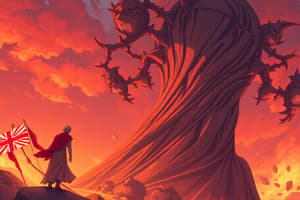Podcast
Questions and Answers
¿Cuál de los siguientes NO es uno de los cinco partes principales del habla en español?
¿Cuál de los siguientes NO es uno de los cinco partes principales del habla en español?
- Verbos
- Adjetivos
- Pronombres
- Preposiciones (correct)
¿Cuál es el orden estándar de una oración en español?
¿Cuál es el orden estándar de una oración en español?
- Objeto-Sujeto-Verbo (OSV)
- Sujeto-Verbo-Objeto (SVO) (correct)
- Verbo-Objeto-Sujeto (VOS)
- Sujeto-Predicado-Verbo (SPV)
¿Quién es el autor de la famosa obra maestra 'Don Quijote'?
¿Quién es el autor de la famosa obra maestra 'Don Quijote'?
- Borges
- Miguel de Cervantes (correct)
- Federico García Lorca
- García Márquez
¿Qué género literario es 'Don Quijote'?
¿Qué género literario es 'Don Quijote'?
¿Quién es conocido por su contribución a la literatura latinoamericana y su obra 'Cien años de soledad'?
¿Quién es conocido por su contribución a la literatura latinoamericana y su obra 'Cien años de soledad'?
¿Quién es conocido por sus obras de 'teatro poético' que combinan elementos de poesía y drama?
¿Quién es conocido por sus obras de 'teatro poético' que combinan elementos de poesía y drama?
¿Cuál de los siguientes escritores es famoso por su estilo literario de realismo mágico?
¿Cuál de los siguientes escritores es famoso por su estilo literario de realismo mágico?
¿Cuál de las siguientes obras es más reconocida de Jorge Luis Borges?
¿Cuál de las siguientes obras es más reconocida de Jorge Luis Borges?
¿En qué ciudad natal estaba profundamente arraigado el trabajo de Federico García Lorca?
¿En qué ciudad natal estaba profundamente arraigado el trabajo de Federico García Lorca?
¿Quién es considerado uno de los autores más influyentes del siglo XX debido a su estilo literario único?
¿Quién es considerado uno de los autores más influyentes del siglo XX debido a su estilo literario único?
Flashcards are hidden until you start studying
Study Notes
Spanish Language
The Spanish language is one of the most widely spoken languages in the world, with approximately 568 million native speakers worldwide. It is known for its unique phonetics and grammar rules. Here's a brief overview of some key points related to the Spanish language:
Gramática
Spanish has five principal parts of speech: verbos (verbs), sustantivos (nouns), pronombres (pronouns), adjetivos (adjectives), and adverbios (adverbs). The structure of sentences follows a standard format: Sujeto-Verbo-Objeto (Subject-Verb-Object) SVO. Word order plays a crucial role, with subject always appearing before the predicate and nouns agreeing with their articles in terms of gender.
Literatura
The Spanish language has a rich literary history, with many notable writers and works. One of the most famous Spanish writers is Miguel de Cervantes, author of "Don Quixote," considered a masterpiece of world literature. Other influential authors include Federico García Lorca, Borges, and García Márquez, who have made significant contributions to the Spanish literary canon.
Don Quixote
"Don Quixote," written by Miguel de Cervantes in 1605, is a novel that has had a profound impact on the world of literature. It tells the story of a man who becomes obsessed with chivalry and sets out on a quest to right wrongs and bring justice to the world, even if it means risking his own life. The novel's exploration of reality and fantasy has been a source of inspiration for countless writers and artists over the centuries.
Federico García Lorca
Federico García Lorca was a Spanish poet, playwright, and theatre director whose work was deeply rooted in the culture and traditions of his native Granada. He is best known for his contributions to the genre of "poetic theatre," which combines elements of poetry and drama. Some of his most famous works include "Bodas de Sangre" ("Blood Wedding"), "La Casa de Bernarda Alba" ("The House of Bernarda Alba"), and "Yerma".
Borges
Jorge Luis Borges was an Argentine writer of Spanish origin whose work has been influential in many genres, including philosophy, literature, and art. He is known for his innovative use of language, complex narratives, and thought-provoking themes. Some of his most renowned works include "Ficciones" ("Fictions"), "El Aleph" ("The Aleph"), and "El jardín de senderos que se bifurcan" ("The Garden of Forking Paths").
García Márquez
Gabriel García Márquez was a Colombian-born writer of Spanish descent who is considered one of the most influential authors of the 20th century. His works often showcase magical realism, a literary style that combines realistic elements with fantastical elements. Some of his most famous novels include "Cien años de soledad" ("One Hundred Years of Solitude"), "Crónica de una muerte anunciada" ("Chronicle of a Death Foretold"), and "El otoño del patriarca" ("The Autumn of the Patriarch").
In conclusion, the Spanish language is a vibrant and diverse linguistic entity with a rich literary history. Its grammar rules are unique, and its literature has produced some of the world's most renowned writers, including Miguel de Cervantes, Federico García Lorca, Jorge Luis Borges, and Gabriel García Márquez.
Studying That Suits You
Use AI to generate personalized quizzes and flashcards to suit your learning preferences.




